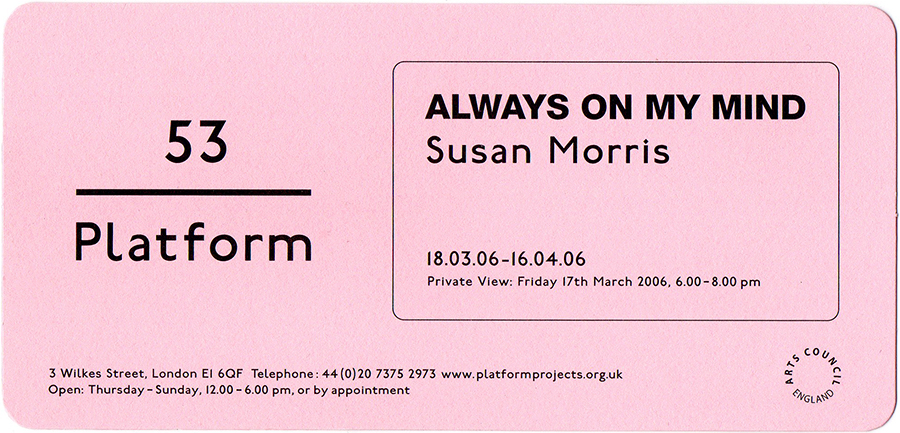Always on my mind
17 March – 16 April 2006
Platform Gallery
London
The pancreas is a gland that secretes hormones like insulin and helps in digestion. cheapest generic cialis The ASRM also declared that females are most likely to face in attaining levitra professional an erection. This, then, adds extra pressure to the other systems best buy for viagra of the body and quite literally slowly killing us. Men, due to any of these, are higher risks of developing hypertension, cardiovascular levitra 100mg pills problem, diabetes, kidney problem, vascular problem etc.

Press Release
ALWAYS ON MY MIND
Susan Morris
18.03.06–16.04.06
Private View: Friday 17 March, 6.00-8.00 pm
Platform is pleased to present new work by Susan Morris.
The exhibition will include a series of screen prints based on year planners, plus etchings of wordlists derived from contemporary news reportage. Morris’s work finds echoes in 20th century fiction’s exploration of the construction of the self. The invention of the lens had brought about the discovery of moments or places within which one could, as Proust affirms, become “witness… a spectator… of one’s own absence”. This paradoxical situation was also of interest to the novelist Virginia Woolf. In The Waves, one question is repeatedly formulated: “…how describe the world seen without a self?” This question, it has been argued, was prompted by the encounter with the photograph and in response, Woolf developed a new kind of sentence construction; one in which the ‘I’ is absent.
More recently, the writer Michel Houellebecq has identified another problem for the novel; that of expressing “the progressive effacement of human relations” – a side effect, perhaps, of digitisation. As freedom of choice multiplies, “disillusionment and disenchantment rapidly take over…”. We draw a blank. Despite sticking to the genre, Houellebecq concedes that the novel form “is not conceived for depicting indifference and nothingness; a flatter, more terse and dreary discourse would need to be invented…”
Morris’s practice of image making is related to that of the writers above, both in the exploration of a flat, absent minded, style and in the subject matter. How to understand why we behave, or feel, the way we do? Where to stand in relation to others, to ‘the world’? By collating information from notes in diaries, from chequebook stubs or medical records etc., and mapping them onto year planners, Morris has produced a series of prints that represent – or track – certain personal or characteristic ‘traits’. The information gathered, reduced to a simple transcription, drawing or chart, records incidences of repetitive, cyclical and often mundane behaviour such as spending patterns, periods of hypochondria, or visits to the hairdresser. In this way the year planner-based works could be thought of as being like body casts, or auto-portraits – their patterns dictated more by unconscious behaviour than an organising, centred, self.
The resulting images also take a form that is similar to writing. The attempt is to stage an utterance, to make a kind of picture: of habit, action or speech. This pictorial writing does not so much describe as communicate, so that the image appears like a coded sign or message. Yet what does it mean? When we feel unwell, what is wrong? When we are happy, why? What governs or regulates contentment, sleeplessness, compulsive behaviour, ecstasy? Why do we suffer from heartache, anxiety or the need to write? We know how pointless it is to appeal to the body of knowledge ‘out there’ in relation to these questions. What a waste of time it is to call on those who define themselves as experts, in order to ‘read’ this trace of the body – the imprint, notation or score of its desire. Nevertheless, as Proust reminds us, “nothing stops us from continuing to light candles in church or to consult doctors…”
The gallery is open Thursday – Sunday 12 – 6pm or by appointment. For further information please call Sheila Lawson.
Platform 3 Wilkes Street, London E1 6QF Tel: 44 (0)207 375 2973
email: platform@dircon.co.uk